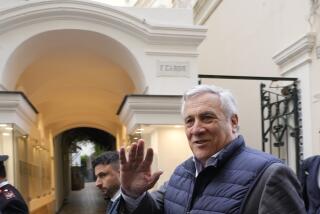U.S. will still pursue Iran sanctions
The United States will forge ahead with a third sanctions resolution on Iran, U.S. officials said Tuesday, arguing that the American intelligence report made public this week showed that it was international pressure that caused Tehran to halt its nuclear weapons program four years ago and that such pressure must be maintained.
But China and Russia, veto-wielding powers on the U.N. Security Council, are likely to use the report’s conclusions to argue that Iran poses no imminent danger and that additional economic sanctions are unwarranted.
China’s U.N. ambassador, Wang Guangya, told reporters Tuesday that Security Council members would have to reconsider new penalties “because I think we all start from the presumption that now things have changed.”
But U.S. Ambassador Zalmay Khalilzad said that his instructions to press for new sanctions “have not changed” because Iran remains in defiance of two Security Council resolutions demanding that it suspend its uranium enrichment activities. Khalilzad said he could start circulating a draft sanctions resolution targeting individuals and companies related to Tehran’s nuclear program as soon as Friday. The National Intelligence Estimate released Monday says Iran probably stopped its nuclear weapons program in 2003 because of international pressure.
“But, it does not say that Iran does not have the intention to develop a nuclear weapons capability, that it has abandoned the goal of acquiring a nuclear weapons capability permanently,” Khalilzad said. “Therefore it should encourage us that if we pressure Iran it will change its approach.”
President Bush said in a news conference Tuesday that the intelligence review “provides an opportunity for us to . . . continue to rally the community to pressure the Iranian regime to suspend its program.”
He said he and Secretary of State Condoleezza Rice were “working the phones” to urge Security Council members to not let up. Britain and France indicated they would continue to press Iran to halt its uranium enrichment and reprocessing programs. In London, a spokesman for Prime Minister Gordon Brown said that “the report confirms we were right to be worried about Iran seeking to develop nuclear weapons. It also shows that the sanctions program and international pressure have had some effect.”
France also said that it still favored tighter sanctions. “Our position has not changed,” said Pascale Andreani, a Foreign Ministry spokeswoman. “We must keep up the pressure on Iran.”
The report raises questions about the premise behind the two previous Security Council resolutions demanding that Iran halt uranium enrichment and reprocessing, and the construction of a heavy-water reactor to “build confidence” that those activities are not contributing to a military program.
Enriched uranium can be used to generate electricity or to produce material for a nuclear bomb, but the latter would require a higher degree of enrichment.
The resolutions also require Iran to answer questions about the nuclear technology it acquired on the black market and developed in secret over the last two decades, a requirement it has partially met in the last two months.
The new report reversed the council’s newfound unity, coming just days after China and Russia seemed to have joined forces with the U.S., Britain, France and Germany in taking a tougher stance toward Iran. Germany is not a member of the Security Council, but it is part of the European Union team that has negotiated with Tehran on the nuclear issue.
A “disastrous” meeting Friday between Iran’s new nuclear negotiator and an EU envoy seemed to have convinced China and Russia that diplomacy had reached a dead end, diplomats said.
EU envoy Javier Solana said Saturday that he had been expecting new initiatives from Iran’s Saeed Jalili and was “disappointed” to receive nothing but a long, defiant lecture.
Jalili visited Moscow on Monday and Tuesday, but neither he nor Russian Foreign Minister Sergei V. Lavrov mentioned the American intelligence report in a news conference after their meeting. Bush said Tuesday that he discussed the Security Council’s next steps with Russian President Vladimir V. Putin, but declined to give a readout.
Russia has voted for sanctions but wants to put the issue back in the hands of the U.N.’s nuclear monitor, the International Atomic Energy Agency, where the focus is more technical than political.
The IAEA’s latest report says Iran had answered some questions about its past clandestine activities, but needed to provide more information and transparency about its current nuclear program. If Iran completes a “work plan” crafted by the agency’s director-general, suspends enrichment and allows inspectors full and spontaneous access to any site, it will have fulfilled the demands of the two resolutions.
More to Read
Start your day right
Sign up for Essential California for news, features and recommendations from the L.A. Times and beyond in your inbox six days a week.
You may occasionally receive promotional content from the Los Angeles Times.






